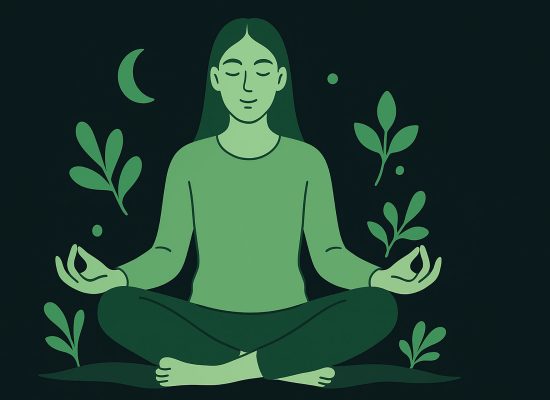Valentine’s Day is often painted as a picture-perfect celebration of love, filled with grand gestures, romantic dinners, and heartfelt surprises. But for many, it brings a different set of emotions—stress, pressure, or even unease. Whether you’re single, in a relationship, or somewhere in between, Valentine’s Day Anxiety is real, and you’re not alone in feeling it. The expectations, comparisons, and emotional triggers can make the day feel overwhelming rather than joyful.
Table Of Content
- Why Valentine’s Day May Be Making You Anxious
- How to Deal with Valentine’s Day Anxiety
- 5 Ways Meditation Helps Manage Valentine’s Day Anxiety
- Best Meditation Techniques for Valentine’s Day
- Finding Peace Through Meditation on Valentine’s Day with Siddha Meditate
- FAQ about Meditation for Valentine’s Day Anxiety
But here’s the good news: you don’t have to get caught up in the stress. Meditation for Valentine’s Day anxiety can help you navigate the day with calm, confidence, and a sense of balance. It’s a simple yet powerful way to ground yourself, embrace self-love, and shift your focus toward what truly matters.
In this article, we’ll explore how meditation for relationships can ease Valentine’s Day Anxiety and offer practical techniques to help you feel more at peace—no matter how you’re spending the day.
Why Valentine’s Day May Be Making You Anxious
As February 14th approaches, do you feel a sense of pressure, stress, or anxiety? If so, you’re not alone! Whether you’re single, in a relationship, or just not a fan of the holiday, it’s totally normal to feel uneasy. Valentine’s Day can stir up all kinds of emotions, and no matter where you stand on the love spectrum, that’s okay. In fact, here are some common reasons people experience anxiety around this day:
- Unrealistic Expectations: The media often depicts Valentine’s Day as a time for grand romantic gestures, making many feel pressured to meet these standards.
- Fear of Loneliness: For singles, it can highlight feelings of isolation or inadequacy.
- Relationship Pressure: For those in relationships, expectations around gifts, affection, and outings can create stress.
- Comparisons to Others: Seeing others celebrate in a seemingly “perfect” way can exacerbate feelings of self-doubt or FOMO (fear of missing out).
- Emotional Triggers: For some, past experiences (like heartbreak or loss) can bring up unresolved emotions.
How to Deal with Valentine’s Day Anxiety
First things first: It’s perfectly okay to feel anxious. There’s no one-size-fits-all way to “celebrate” or “handle” Valentine’s Day. If you’re feeling overwhelmed and wondering how to deal with this Valentines Day anxiety, give yourself permission to skip the things that don’t feel right for you. You don’t have to match anyone else’s expectations. Instead, consider shifting the focus to what you truly need—whether that’s self-care, quality time with loved ones, or simply letting the day pass without stress. You deserve to celebrate in a way that aligns with your own values and needs.
Here’s a simple reminder: This day doesn’t have to be about romantic love at all. In fact, it can be the perfect opportunity to nurture self-love or deepen connections with people who truly matter to you—without all the external pressures. So take a deep breath. Let go of societal expectations. You’ve got this.
If anxiety starts creeping in, consider practicing Meditation for Valentine’s Day anxiety. A few mindful moments can help shift your focus, ease stress, and bring a sense of calm to the day—no matter how you choose to spend it.

5 Ways Meditation Helps Manage Valentine’s Day Anxiety
Meditation is a powerful practice for shifting your mindset, easing anxiety, and approaching Valentine’s Day with a sense of peace and confidence. If you’re dealing with Valentine’s Day anxiety, meditation can an absolute game-changer to help calm your nerves and stay grounded. Here are five ways meditation can help:
1. Boosts Confidence and Self-Love:
Meditation helps cultivate a positive self-image, with practices like loving-kindness meditation fostering self-compassion and a stronger connection with yourself. Research shows that this kind of meditation boosts positive emotions, including self-esteem and social connection. For Valentine’s Day, strengthening self-love can lessen the anxiety that often comes with being single or comparing yourself to others. You’ll enter the day feeling fulfilled internally, rather than relying on external validation to feel good about yourself.
If you’re wondering how to deal with Valentine’s Day anxiety, starting your day with a simple meditation practice can set a positive tone, helping you stay grounded, boosts your confidence and emotionally balanced.
2. Enhances Mindfulness
Meditation for Valentines Day anxiety teaches mindfulness, which helps you stay present and focused, preventing you from getting overwhelmed by worries about the future or negative memories from the past. Studies show that mindfulness practices reduce stress and anxiety, and help you let go of rumination. Whether you’re spending the day alone or with others, mindfulness enables you to embrace the present moment, reducing stress and enhancing your appreciation for what you have in the here and now.
3. Helps You Get to Know Yourself Better
Meditation isn’t just about clearing your mind—it’s about getting more in touch with your inner world. It offers a quiet space for reflection, where you can understand your true desires, needs, and boundaries. Whether you’re looking for deeper connection or simply some quality time with yourself, meditation helps you move through Valentine’s Day with intention and clarity.
Practicing Stress Relief Meditation for Valentine’s Day can be a powerful way to ease emotional tension, helping you release anxiety and embrace the day with a sense of calm and self-assurance.
If you’re interested in relationship meditation, read “Mindful Communication: How Meditation Strengthens Relationships“
4. Promotes Healthy Communication, Boundaries, and Expectations
Meditation enhances emotional regulation, improving the way we communicate and set boundaries. By practicing mindfulness and awareness, it’s easier to express your feelings clearly and assertively, without getting lost in emotional reactivity. Valentine’s Day anxiety meditation helps you maintain a calm, grounded presence, allowing you to communicate your needs effectively—whether you’re talking with a romantic partner, friends, or even navigating societal pressures and expectations.
A study published in Mindfulness found that couples who practice meditation together experience greater acceptance of each other’s imperfections, leading to improved relationship satisfaction. By fostering deeper emotional awareness and reducing reactivity, meditation helps partners communicate more effectively and build stronger, more compassionate connections. If you’re looking for a way to navigate relationship pressures or expectations on Valentine’s Day, practicing Stress Relief Meditation for Valentine’s Day with your partner can create a sense of calm and understanding, allowing you to celebrate the day with presence and ease.
5. Helps You Navigate Your Emotions
Sometimes, Valentine’s Day brings up feelings of loneliness, frustration, or even sadness. Meditation gives you the space to process these emotions without judgment. It helps you sit with discomfort and gently release it, so you’re not carrying around unnecessary emotional baggage. You get to experience your feelings, then move forward with greater peace and resilience.

Best Meditation Techniques for Valentine’s Day
The beauty of meditation for Valentine’s Day is that it can be tailored to suit your specific needs, whether you’re looking to enhance your self-love, relieve stress, or nurture your relationships. Here are some of the best techniques to use:
Short Breathing Exercises (for Immediate Calm): Quick, focused breathing can activate the parasympathetic nervous system, reducing heart rate and calming anxiety. Technique: Try the “4-7-8” method—inhale for 4 seconds, hold for 7 seconds, exhale for 8 seconds. Repeat for a few minutes to lower stress and bring your mind back to the present.
Loving-Kindness Meditation (for Self-Love and Compassion): This practice helps you cultivate compassion and love, first for yourself and then for others, reducing feelings of isolation or inadequacy. Sit quietly and silently repeat phrases like “May I be happy, may I be healthy, may I be safe.” Gradually expand this intention toward others in your life. This practice is ideal for releasing any negative emotions tied to the holiday.
Relationship & Intimacy Meditation (for Relationship Harmony): Guided meditations designed for couples help foster emotional intimacy and better communication, which can be especially useful as a Valentine’s Day anxiety meditation practice. Try a partner meditation that focuses on deep breathing in sync or sharing positive affirmations about each other. This can help strengthen your connection and reduce relationship-based stress.
Self-Love Affirmations (for Reframing Negative Thoughts): Repeating affirmations can shift your mindset from scarcity or doubt to abundance and self-worth. Create affirmations like “I am deserving of love” or “I attract healthy, fulfilling relationships.” Repeat them daily or whenever you feel anxiety creeping in.

Finding Peace Through Meditation on Valentine’s Day with Siddha Meditate
Meditation can be a powerful tool to help you manage Valentine’s Day Anxiety, whether you’re celebrating with a partner, friends, or just with yourself. Through practices like Valentine’s Day Anxiety Meditation, you can foster self-love, mindfulness, emotional clarity, and healthy communication, all of which allow you to approach the holiday with calm and confidence. If you’re wondering how to deal with Valentine’s Day anxiety, incorporating Stress Relief Meditation for Valentine’s Day into your routine can help you stay grounded, reducing stress and enhancing your connection to yourself and others. Whether you’re seeking to feel more aligned with your emotions or to enhance your relationships and compassion, Siddha Meditate offers simple and effective practices to transform how you experience the day.
FAQ about Meditation for Valentine’s Day Anxiety
1. What is Valentine’s Day anxiety, and why do people experience it?
Valentine’s Day Anxiety is the stress, pressure, or unease some people feel leading up to February 14th. This can happen due to unrealistic expectations, fear of loneliness, relationship pressure, comparisons to others, or emotional triggers from past experiences. No matter your relationship status, it’s normal to feel this way. Instead of letting societal pressures define your day, you can choose to celebrate in a way that aligns with what truly matters to you.
2. How to deal with Valentine’s Day anxiety?
There’s no single way to handle Valentine’s Day Anxiety, but one of the most effective approaches is shifting your focus inward. Meditation helps create emotional balance, eases stress, and fosters self-love, so you don’t feel dependent on external validation. If you’re struggling with the pressure of the day, take a moment to breathe, let go of expectations, and use meditation to cultivate a sense of peace. A simple meditation session in the morning can set a positive tone for the entire day.
3. What are the best meditation techniques for Valentine’s Day anxiety?
For Meditation for Valentine’s Day Anxiety, try:
– Loving-Kindness Meditation – Boosts self-love and reduces negative emotions.
– Breathwork Exercises – Quick techniques like the 4-7-8 method can calm anxiety instantly.
– Mindfulness Meditation – Keeps you present, preventing overthinking and stress.
– Couples Meditation – Helps partners deepen their bond and ease relationship pressure.
These simple practices can help you navigate Valentine’s Day with more balance and emotional clarity.
4. How does couples meditation help with Valentine’s Day stress?
For those in relationships, Stress Relief Meditation for Valentine’s Day can help reduce pressure and deepen emotional intimacy. A study published in Mindfulness found that couples who practice meditation together experience higher relationship satisfaction because mindfulness promotes acceptance and better communication. Whether you meditate together in silence or follow a guided practice, shared meditation fosters connection, reduces anxiety, and helps you enjoy the day with ease.







